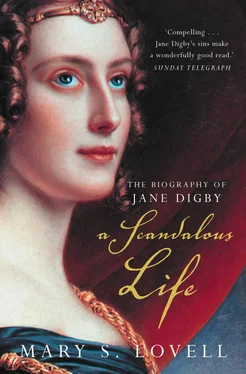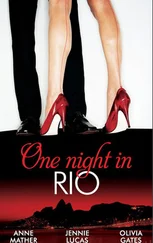At first she regarded him merely as an amusing and pleasant companion; his constantly repeated proposals became almost a joke between them, prettily parried by Jane. Indeed, Charles’s devotion and frequently professed wish to marry her must have counterbalanced to some extent the pain of rejection by Felix. Yet she loved Felix so utterly that no man could even begin to be a substitute. She explained her feelings to Charles as she had explained them to the King, but Charles continued to press his suit. After all, he must have thought, he was here in Munich; Felix was not.
Felix continued to write to Jane, however, and though he resisted a meeting his constant declarations of love gave her reason to hope that their relationship could be resuscitated. In an attempt to assist in their reunion, Ludwig suggested that the couple might meet secretly at Schloss Berg, a Wittelsbach hunting lodge on Lake Starnberg, some forty miles south-west of Munich. There in romantic isolation they could discuss their differences and perhaps achieve a rapprochement without inviting further gossip. At the end of October 1831 Jane wrote to Felix telling him of the meeting proposed by the King. She begged him to join her and set out for Schloss Berg.
Full of anticipation, though Felix had not yet actually agreed to meet her, Jane waited for him. The poem she wrote upon her arrival wondered anxiously whether he would look at her ‘as of old’ or whether she must expect ‘a change I never thought to see’. Convinced that he merely had to see her to know that she loved only him, regardless of what others told him and the deceitful ‘breath of shrilling slander’, she refused to believe he could receive her coldly after all they had meant to each other.
Her confidence in her ability to win Felix back was undoubtedly due to her experience that where men were concerned one look was all it usually took. Felix possibly knew this too; hence his attitude regarding a meeting. It must not be forgotten, either, that Felix was an unusual man with unique qualities. His official court biographer in Vienna insisted he had mystical powers: ‘The excessive life-force of the Prince is illustrated by the fact that he had a magnetic influence over women – not in the romantic and figurative way, but actually and medically. His sister was supposed to come especially to visit him and touch his hand to acquire more strength.’ 25 Perhaps this explains, in part, Jane’s obsession.
Jane remained at Berg for several weeks in October and November 1831, wandering in the glorious woodlands alone, on horseback or on foot, willing her prince to come to her. One day her hopes soared when a visitor arrived, but it was not Felix. The persistent Charles Venningen had pursued her to her secret hideaway. Fearful that his presence might be misinterpreted by both the King and Felix, Jane insisted Charles return to Munich immediately and to ensure he did so made him the bearer of one of her frequent letters to the King. ‘I am so glad, dearest Lewis, to have had this opportunity of sending you these lines by Monsieur de Venningen who came here today. By this means you will receive them sooner … as he returns this evening’ – not, however, before he had made some ardent advances.
After ten days Felix wrote to advise that he could not meet Jane because of his commitments. As consolation the same post brought two letters from the King, a bouquet of violets and a book of his own poems preceded by the handwritten inscription:
These poems show you, show you my innermost feelings
You who became a victim of love, you will understand me
As I understand you, dearest, whom the world has exiled.
I will never judge you harshly, even if all the world does!
I cannot condemn you, because I understand it all.
Jane replied: ‘Do you really long for my return? Your wish shall be gratified … My first care shall be to sit for your picture. You are very impatient to have it finished, and that wish is sufficient for your Ianthe.’ 26 She returned to Munich having written her own dispirited poem of disappointment: ‘He comes not, ’twas but fancy’s dream which mocked my hopes with visions bright.’ 27
It is difficult to explain Schwarzenberg’s behaviour. If he did not wish the relationship to continue, why the constantly repeated avowals which kept Jane dancing to his tune? Had he simply told Jane that he no longer loved her it would have set her free, though painfully. The King sought to console his lovely young friend, and during the course of their conversation queried Baron Venningen’s frequent attendance at Jane’s home. When Jane confessed that his advances were becoming pressing, the King was alarmed. He begged her to discourage Charles and to be true to their shared ideal of love in its purest form.
One of Ludwig’s minor self-indulgences had been to commission the Schönheits-Galerie (Gallery of Beauty) for the Festsaalbau (or assembly rooms) at the Residenz. Similar in concept to the Lely series of Charles II’s ‘Ladies of the Bedchamber’, it consisted of a series of paintings by the court artist, Josef Stieler, of beautiful women. They were mainly members of Ludwig’s court (some were his mistresses), but Ludwig’s appreciation of pulchritude was catholic and women of every social rank were included, from the beautiful daughter of a Munich shoemaker to the wife of the British Minister, Lord Milbanke. In this gallery the royal connoisseur liked to wander each morning to contemplate in an inspirational communion of beauty. Ludwig asked Jane to sit for Stieler as an example of her type of beauty, and was present for most of the sittings.
It was a pretty compliment, but, just as Lely did before him, Stieler, though undoubtedly an artist of great talent, reduced some of his subjects to a contemporaneous ideal. Technically speaking, his portrait of Jane set against a typically classical background captures perfectly the sumptuousness of her clothes, the richness of her colouring, the transparency of her skin, the symmetry of her features. But the quicksilver quality which was Jane’s real beauty eluded Stieler. At the time of this portrait Jane was in her mid-twenties and just coming into her full magnificence, and Stieler himself wrote that, of all the women in the Schönheits-Galerie, Jane was the only one who could rival in beauty the exquisite Marchesa Marianna Florenzi. 28 Jane herself some time later nevertheless made the comment that it was not ‘very like’. A white marble bust of Jane that Ludwig commissioned Josef Bandel to sculpt a month later confirms the slender voluptuousness hinted at in Stieler’s portrait.
Arguably, her intelligent vivacity as much as her physical beauty attracted Ludwig, and also brought Charles Venningen back to her time and again. But it was her own physical needs that broke her sexual fast in November. It is not entirely clear whether this was with Ludwig or with Charles, but the reawakened desire provoked by the encounter created difficulties, as she told Ludwig in a letter:
Forgive me, dearest Lewis, if our last night’s conversation pained you, but your openness, affection and sincerity encourage mine.
It is not to be denied that rapture, untasted for six months , has [now] reawakened passions I flattered myself were nearly if not quite extinguished. Still, dearest, I repeat my intentions remain unchanged … My word of honour I regard as a sacred vow and I dare not, dare not, give it lightly.
What would [you]… think if after all my promises to the contrary I fell a victim? Do not be thus unhappy. I vow not to deceive you, I never will. 29
In her latest letter to Felix she had begged him to allow her to come and live near him in Berlin. If he would not agree, she wrote, she would go into a convent and take Didi with her. 30
Читать дальше











